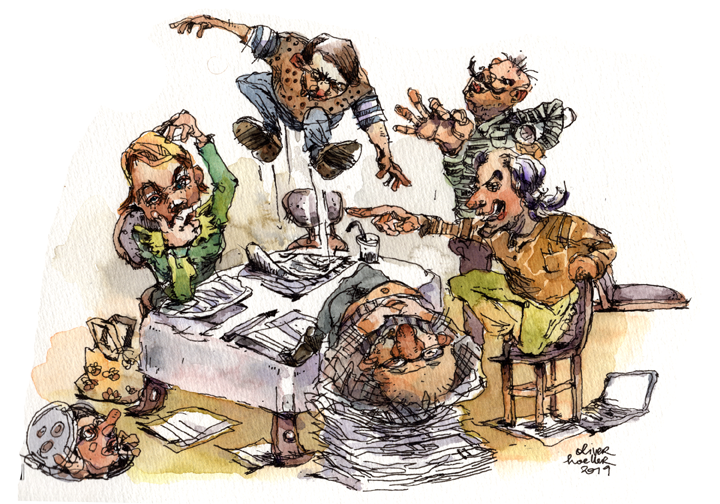

Should there be a kind of “jury service” for young faculty on grant funding panels?
Being successful in research – and probably also in science more generally – means being able to acquire third-party funding. Whether you’re an established professor with guaranteed core funding, or junior faculty with institutional support but a ticking clock in the background, or a happy-go-lucky and probably rather stressed freelancer who is 100% self-funded, you depend on getting those grants. Not being able to secure a steady funding stream means a slow asphyxiation of research activity in the group.
The problem is that writing good grant proposals is hard, and the opportunity to practice is extremely limited.
In benchwork, making mistakes is acknowledged as part of the learning experience, and we consequently make as many as it takes in order to become an expert in any given technique.
Publishing is much more stressful, because the penalty for making mistakes – rejection – is far higher than simply setting up the assay anew. Even with that hanging over you though, if you’re reasonably productive you’ll go through the process often enough to optimise and get a sense of the parameters. Plus, we read so many papers that it’s relatively straightforward get a good example of what is expected, and this allows you to calibrate your submission to a particular journal.
This same protocol doesn’t apply to funding. There’s even more riding on the big grants than there is on a paper – maybe the survival of an entire group, or a career-altering transition to scientific independence. But learning the lingo, getting a sense of what to write, is much harder – because it’s a process that we go through less often, and we don’t really get a chance to see what successful proposals look like.
Clearly, one could argue that the solution is simply to make people have to apply for lots of small grants and sharpen their skills by lowering the cost of any one grant rejection. But unlike either benchwork or paper-writing, grant-writing is only indirectly linked to research productivity. Proposing a research program is a lot different from prosecuting it and besides, why insist that researchers allocate even more time to grant-writing than they do already? Surely the priority has to be the data generation and dissemination – after all, that’s what serves science itself best.
And increasing the frequency of application doesn’t address the more serious and rather more political concern. Grant applicants will get feedback – sometimes contradictory, sometimes opaque – from the reviewers, but they tend to get almost no feedback whatsoever on the decision-making process that ultimately led to a “yes” or “no” outcome. Writing many proposals will let you improve your own mode of expression, but if you are fundamentally misunderstanding the rules of the game or underestimating the weight of particular parameter, then you will simply keep making the same mistake over and over again, and your success rate will only increase incrementally.
So what’s the solution? An indirect one is workshops – people can devote a small investment of time to hear from others who know what’s going on better than they do. But the availability is often patchy, and even the best ones still suffer from that indirectness. You can get detailed feedback on a failed proposal from any number of experts, but that’s still not going to be as informative as being a fly on the wall during the actual deliberations would have been.
A far better and rather more radical solution would be to introduce a kind of optional “jury service” for young faculty on grant funding panels. Unlike real jury service, there would be no role in judgement and the position would primarily be that of an observer, or possibly helping out with non-critical tasks. But simply to witness the funding process at first hand, to see the kind of factors that tend to encourage equivocation, or are flashpoints for discussion, or how rather conveniently vague terms such as “evidence of leadership” or “independence” are actually interpreted would arguably offer more than an entire semester of workshops.
Science prides itself on its meritocratic nature, and the equal opportunity given to apply for research funding is a great equaliser within the profession. No matter who you are, where you’re based, or who you worked for, in theory a good proposal should always be able to outcompete inferior co-submissions.
In reality of course, the Matthew Effect functions here as subtly as it does elsewhere. Being affiliated to a prestigious institution is beneficial, and coming from a well-respected lab inspires trust. Those things also increase the likelihood of bringing you into contact with expert advice and first-hand views of successful applications, and in a system where younger applicants are not privy to the decision-making process, that may be enough to give a significant advantage.
By starting a system of optional jury service, you’d enable junior faculty to see how funding decisions are made, what factors are important to those decisions, and that would in turn help them to structure their proposals. It is especially likely to be useful if those faculty are not already in a powerhouse university/institute, while those who feel they have nothing to gain could opt out. Young scientists need to learn the lingo, not linger longer over uncompetitive proposals. Jury service might make all the difference between the two outcomes.
Originally posted on Total Internal Reflection - here.





Join the FEBS Network today
Joining the FEBS Network’s molecular life sciences community enables you to access special content on the site, present your profile, 'follow' contributors, 'comment' on and 'like' content, post your own content, and set up a tailored email digest for updates.